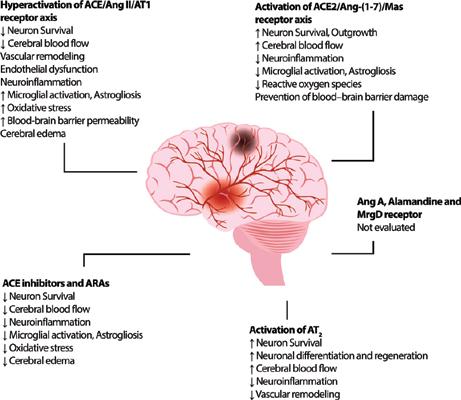Protein & Peptide Letters ( IF 1.0 ) Pub Date : 2020-05-31 , DOI: 10.2174/0929866527666191218091823 Lucas M Kangussu 1 , Lucas Alexandre Santos Marzano 2 , Cássio Ferraz Souza 2 , Carolina Couy Dantas 2 , Aline Silva Miranda 1, 2 , Ana Cristina Simões E Silva 2

|
Cerebrovascular Diseases (CVD) comprise a wide spectrum of disorders, all sharing an acquired or inherited alteration of the cerebral vasculature. CVD have been associated with important changes in systemic and tissue Renin-Angiotensin System (RAS). The aim of this review was to summarize and to discuss recent findings related to the modulation of RAS components in CVD. The role of RAS axes is more extensively studied in experimentally induced stroke. By means of AT1 receptors in the brain, Ang II hampers cerebral blood flow and causes tissue ischemia, inflammation, oxidative stress, cell damage and apoptosis. On the other hand, Ang-(1-7) by stimulating Mas receptor promotes angiogenesis in brain tissue, decreases oxidative stress, neuroinflammation, and improves cognition, cerebral blood flow, neuronal survival, learning and memory. In regard to clinical studies, treatment with Angiotensin Converting Enzyme (ACE) inhibitors and AT1 receptor antagonists exerts preventive and therapeutic effects on stroke. Besides stroke, studies support a similar role of RAS molecules also in traumatic brain injury and cerebral aneurysm. The literature supports a beneficial role for the alternative RAS axis in CVD. Further studies are necessary to investigate the therapeutic potential of ACE2 activators and/or Mas receptor agonists in patients with CVD.
中文翻译:

肾素-血管紧张素系统和脑血管疾病:实验和临床证据。
脑血管疾病(CVD)包括范围广泛的疾病,所有疾病均共享后天性或遗传性脑血管系统的改变。CVD与全身和组织肾素-血管紧张素系统(RAS)的重要变化有关。这篇综述的目的是总结和讨论与CVD中RAS成分调节有关的最新发现。RAS轴的作用在实验诱发的卒中中得到了更广泛的研究。Ang II通过大脑中的AT1受体阻碍大脑的血流,并导致组织缺血,炎症,氧化应激,细胞损伤和细胞凋亡。另一方面,Ang-(1-7)通过刺激Mas受体促进脑组织中的血管生成,减少氧化应激,神经炎症,并改善认知,脑血流量,神经元存活,学习和记忆。在临床研究方面,用血管紧张素转换酶(ACE)抑制剂和AT1受体拮抗剂治疗对中风具有预防和治疗作用。除了中风,研究还支持RAS分子在脑外伤和脑动脉瘤中也具有类似作用。文献支持替代RAS轴在CVD中的有益作用。有必要进行进一步的研究以研究ACE2激活剂和/或Mas受体激动剂在CVD患者中的治疗潜力。文献支持替代RAS轴在CVD中的有益作用。有必要进行进一步的研究以研究ACE2激活剂和/或Mas受体激动剂在CVD患者中的治疗潜力。文献支持替代RAS轴在CVD中的有益作用。有必要进行进一步的研究来研究ACE2激活剂和/或Mas受体激动剂在CVD患者中的治疗潜力。











































 京公网安备 11010802027423号
京公网安备 11010802027423号